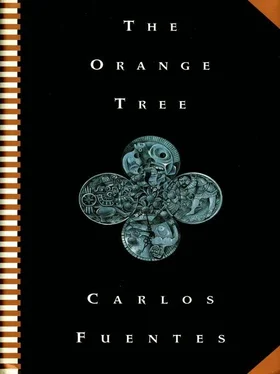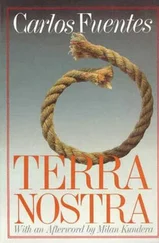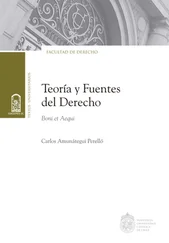I saw them sail from the ports of the Gulf of Guinea, where the Portuguese traders would arrive with shiploads of merchandise for the African kings, to exchange for their enslaved population — redeemed, of course, by religion. The ships would empty of silks, percales, thrones, dishes, mirrors, views of the Ile de France, missals, and chamber pots; they would fill up with husbands separated from their wives — the women sent one place, the men elsewhere, their children similarly divided, and all thrown into crowded cargo holds with no place to move around, forced to shit and piss on top of one another, to touch only what was near them and to speak to others, mortally embracing them, who understood nothing. Has there ever been a race more humiliated, despised, subjected to the pure whim of cruelty than they?
* * *
I saw the ships sail out of the Gulf of Guinea, and now, here in my New World, I swore it would never happen again.
This was like the Golden Age the ancients evoke, which is how I recited it to my new friends from Antilia, who listened to me without understanding. After all, I was describing them and their time: first came the Golden Age, when man governed himself with uncorrupted reason and constantly sought the good. Not forced by punishment, not spurred on by fear, man used simple words and possessed a sincere soul. There was no need for law where there was no oppressor, no need for judges or courts. Or battlements, or trumpets, or swords to be forged, because everyone was ignorant of these two words: yours and mine.
Was it inevitable that the Iron Age come? Could I put it off? For how long?
I had reached the Golden Age. I embraced the noble savage. Was I going to reveal his existence to Europeans? Was I going to deliver these sweet, naked people, devoid of malice, to slavery and death?
I decided to be silent and to stay among them for several reasons, using several strategies. I don’t want the reader to think he’s dealing with a fool: we Genoese may be liars but we aren’t idiots.
I opened my trunk and found the hats and beads. It gave me pleasure to give them to my hosts, who enjoyed themselves immensely with the trinkets. But I asked myself: If my intention was to reach the court of the grand khan in Peking and the fabulous empire of Japan, whom did I think I was going to impress with this junk I picked up in the Puerto de Santa María market? The Chinese and the Japanese would have laughed at me. So, within my mammary, unconscious zone, I knew the truth: I would never reach Cathay because I didn’t really want to reach Cathay; I wanted to get to Paradise, and in Eden the only wealth is nakedness and unawareness. Perhaps that was my real dream. I carried it through. Now I would have to protect it.
I was helped by the most ironclad law of Portuguese navigation, the law of secrecy. The sailors who left Lisbon and Sagres had imposed a policy of secrecy at all costs, ordered by their Sebastianist, utopian monarchs. Any Portuguese captain (to say nothing of common sailors) who revealed the routes or the places they’d discovered would be hunted to the ends of the earth and, when found (which they would be, don’t doubt it for a second), would be drawn and quartered. The heads, feet, and hands of traitors had been seen all along Portuguese routes, from Cape Verde to the Cape of Good Hope, from Mozambique to Macao. The Portuguese were implacable: if they encountered ships intruding in their sea-lanes, they had standing orders to sink them immediately.
I am availing myself of that absolute silence. I turn it inside out like a glove and use it for my own advantage. Absolute silence. Eternal secrecy. What became of the talkative, fantastical Genoese? Where did he really come from? Why, if he was Italian, did he write only in Spanish? But why doubt he was Italian when he himself (that is, I myself) wrote: I am a foreigner. But what did it mean in those days to be a foreigner? A Genoese was a foreigner to a Neapolitan, as was an Andalusian to a Catalan.
As if I had foreseen my destiny, I sowed minuscule confusions. In Pontevedra, I left a false archive to drive the Galicians insane. No matter, their heads are a muddle of realism and fantasy. On the other hand, in Estremadura, where they never dream, I convinced people that I grew up in Plasencia, when in fact it was Piacenza. As for Majorca and Catalunia, well, I gave them the flesh of my flesh: my last name, that of the Holy Spirit, which abounds on those coasts. Corsica, which as yet has produced no man of note, could claim me because of a lie I told to two drunken abbots when I passed through Bastia.
I fooled no one. The only thing about myself I put down in writing clearly is this:
At a very tender age, I became a seafarer and have continued to be one until this very day … For more than forty years I have been doing this work. Everything that until today has been sailed I have sailed; everywhere I have traveled. I have had business and conversation with wise folk, churchmen and laymen, Latins and Greeks, Jews and Moors, and with many others of other sects.
My country is the sea.
* * *
I threw the bottle with its pages of legend into the sea — all the lies about sirens and amazons, gold and pearls, leviathans and sharks. But I also told the truth about rivers and coasts, mountains and forests, arable land, fruit and fish, the noble beauty of the people, the existence of Paradise.
I disguised it in a name I heard here and created a special identity for it. The name was Antilia. The identity was intermittence; that is, the isle of Antilia would appear and disappear. One day, the sun would reveal it; the next, the mists would blot it out. It floated one day and sank the next. A tangible mirage, a fleeting reality between sleep and wakefulness, this land of Antilia was only visible, ultimately, for those who, like me as a child, could imagine it first.
I tossed the bottle with the legend into the sea, certain that no one would ever find it. If someone did, he would read in it the ravings of a madman. Led by my sweet friends to the place that would be my permanent residence, I told myself a truth that only now I can put on record.
This was the place: a freshwater gulf into which seven rivers emptied, overwhelming the salt sea with their fresh force. A river is an eternal birth, renovation, perpetually renewed cleanliness and spirit, and the rivers of Antilia flowed into the gulf with a delightful, constant noise that dispelled the clamor of the Mediterranean alleys with the din of their peddlers, children, doorkeepers, rogues, street surgeons, butchers, trinket sellers, knife sellers, oil sellers, tinkers, bakers, skinners, and barbers. It also banished the silence of the night and its fear. The silence of imminent death.
Here they assigned me a hut and a hammock (the name of their woven beds). A tender woman, eager to please. A canoe for my little trips, and two young oarsmen to accompany me. Plenty of food, dorados from the sea and trout from the river, deer and turkey, papaya and custard apples. Out of my sack I took orange seeds, and together we planted them along the valleys and hillsides of the Gulf of Paradise. The trees grew better in Antilia than in Andalusia, with shiny leaves and fragrant flowers. I never saw better oranges, oranges that so resembled the sun they made the sun envious. I finally had a garden of perfect breasts, suckable, edible, renewable. I had conquered my own life. I was the eternal owner of my recovered youth. I was a boy without the shame or nostalgia of being one. I could suck oranges until I died.
That’s right, paradise. So I stayed there, liberated above all from the horrible need to explain a different reality to Europeans, a history for them inexplicable. How could Europe understand that there is a history different from the one it made or learned? A second history? How will Europeans accept that the present is not only the heir of the past but the origin of the future? What a hideous responsibility. No one could stand it. Especially me.
Читать дальше












